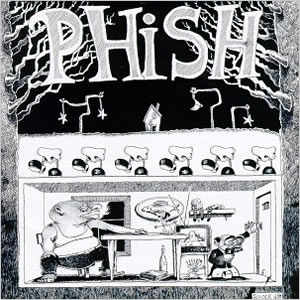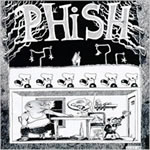Junta by Phish
 Originally released only on cassette, Junta by Phish, defies almost every convention for debut albums. The album was independently recorded and produced by the Vermont-based group but contains top-notch sound to complement the rich progressive-rock influenced epics that persist throughout the album’s lineup. Titled after the band’s first official manager, the album contains mainly nontraditional structures and arrangements based on jazz fusion and improvisation, resulting in symphonic-like epics where each member is given ample room to shine. The rare, few “basic” songs on Junta are mainly light and tend to lean towards the upbeat, funk side of the rock spectrum.
Originally released only on cassette, Junta by Phish, defies almost every convention for debut albums. The album was independently recorded and produced by the Vermont-based group but contains top-notch sound to complement the rich progressive-rock influenced epics that persist throughout the album’s lineup. Titled after the band’s first official manager, the album contains mainly nontraditional structures and arrangements based on jazz fusion and improvisation, resulting in symphonic-like epics where each member is given ample room to shine. The rare, few “basic” songs on Junta are mainly light and tend to lean towards the upbeat, funk side of the rock spectrum.
Phish was formed by guitarist Trey Anastasio, bassist Mike Gordon and drummer Jon Fishman at the University of Vermont in 1983 and they played their first live performance at the school’s cafeteria late that year. They cut their teeth in the mid eighties playing Grateful Dead songs. In 1985, keyboardist Page McConnell joined the group, completing the band’s four-piece lineup, which persists to this day. During this era, the group distributed at least six different experimental self-titled cassettes and Anastasio went so far as to write a nine-song concept album accompanied by a written thesis called The Man Who Stepped into Yesterday.
In 1988, the band began a rigorous practice schedule, which included locking themselves in a room and jamming for hours on end to “discover” new material. Junta is a product of a couple of these sessions and was brought as one piece to the studio to be recorded in its entirety.
Anastasio got the bulk of compositional credit on the album, starting with the opener “Fee”, a truly excellent song with Caribbean and jazz percussive beats and tones. The soaring vocals with staccato backing vocal scats shows that, although they rarely display it, the group has some vocal chops. The first epic, “You Enjoy Myself” is in sharp contrast to the melodic opener, making its arrival one of the few really awkward moments on the album. Improvised with odd timings, the piece works into a progressive waltz, driven by the organ and piano McConnell. Then at about the midway point, an excellent guitar rips in for a few fleeting moments before the climatic funk section starts along with one word chants and a strong bass by Gordon.
“Esther” takes the album on yet another wild turn, as lyric-rich journey which changes mood from carnival to church to an ultimate tranquil tragedy of drowning. The excellent piano riffs by McConnell are reminiscent of Tony Banks during the better Genesis years and the persistent groove by Fishman throughout provides the glue for the song through its nine and a half minutes. “Golgi Apparatus” starts as definite funk jam but soon morphs into something more rock oriented, perhaps the most rock-oriented song on the album, showing the versatility of the group. The next couple of tracks tend to get a bit repetitive. “Foam”, repeats the same mechanical pattern forged by a bass riff with sharp piano notes and guitar motifs above, while “Dinner and a Movie” gets a bit mundane lyrically, but is interesting musically. This is the part of the album where you’re just waiting for a release, the whole jam thing is a bit exhausting by this point.
Then comes the most rewarding song on the album, “The Divided Sky”. This mostly instrumental, twelve-minute epic begins with a nice acoustic intro with the perfect complement of xylophone by McConnell and bass by Gordon. The intro section is cut by deep vocal harmonies where the music stops completely before returning with a totally different feel and arrangement. Here the group methodically builds towards a guitar lead before breaking down to a quiet organ motif on which a new, signature guitar riff builds the song back up. Then comes the payoff of the greatest guitar lead on the album by Anatasio and a full-fledged musical jam by the entire band through the latter part of the song. In contrast, the follow-up eleven-minute “David Bowie”, while still a great jam, pales as a follow-up to “The Divided Sky”.
“Fluffhead” starts with a fine, elongated acoustic guitar riff and honky-tonk piano and breaks into a catchy (albeit silly) hook. Combined with the instrumental part “Fluff’s Travels” (which really isn’t a separate piece), this is the longest piece on the original album, which is saying something for an album like Junta. Another good guitar lead over some very odd chords and timing also make for, perhaps, the closest to a true jazz improv. Eventually it all releases into reprise of “Fluffhead” with some Gospel-like revival singing improvisation before it dissolves into a simple, strumming acoustic riff and a winding rendition of the opening riff. The album wraps with “Contact”, the sole composition by Gordon, whose slow bass riff introduces the song. Much like the album’s opener, this closer has a Latin feel and, while lyrics are again repetitive again, but not as mundane as on other songs and the tune is more than salvaged by some nice bass motifs and a bridge with romantic lyrics.
Junta finally got wide release when Elektra Records distributed a massive two CD, two-hour release in late 1992, three and a half years after the original cassette. The newer version included three bonus tracks – “Sanity”, “Icculus”, and the twenty-five minute “Union Federal” – along with a longer version of “Contact”. In 2012, a vinyl version of the original eleven song version of Junta was released, which in a way completed this classic album’s journey to the appropriate medium.
~
Part of Classic Rock Review’s celebration of 1989 albums.






